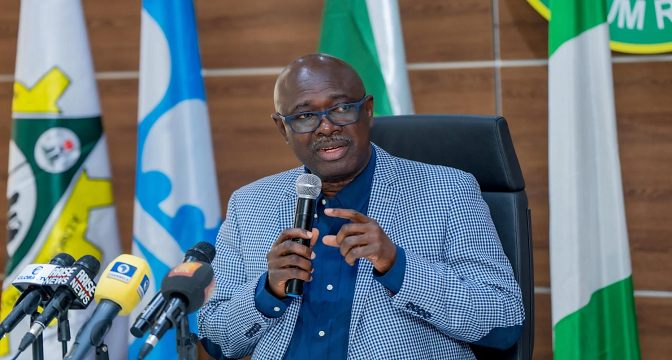Africa Energy Security must become a continental mission—not just a national one. This was the strong message from Nigeria’s Minister of State for Petroleum Resources (Oil), Senator Heineken Lokpobiri, during the Africa Oil Week 2025 Ministerial and CEO Leadership Forum. Held in Accra, Ghana, the forum gathered top energy minds from across Africa and beyond.
Lokpobiri delivered a firm but hopeful message. He revealed that Africa spends over $120 billion every year on hydrocarbon imports. That amount, he stressed, is both shocking and unsustainable. Instead of sending money abroad, African nations should work together to meet their own energy needs. According to the Minister, the solution lies in stronger regional collaboration.
While addressing the packed forum, he reaffirmed Nigeria’s leadership in shaping Africa’s energy transition. He noted that Nigeria has always taken bold steps in oil and gas development. However, he insisted that no single country can tackle Africa’s energy challenges alone. Collaboration is no longer optional—it’s urgent.
Read more: Togo Launched Second Phase of Business Census
Moreover, Lokpobiri emphasized that regional integration is key to long-term energy security. Africa has the natural resources, the talent, and the market. What it lacks, he argued, is unity in execution. Countries must invest in shared infrastructure such as cross-border pipelines, regional refineries, and joint power grids. These projects will not only reduce costs but also increase efficiency and stability.
In addition, the Minister highlighted the importance of harmonizing technical standards. Too often, projects are delayed due to mismatched regulations or incompatible systems. Aligning national policies would make cross-border investments more attractive. It would also improve project timelines and reduce risks.
He also pointed out the need to invest in human capital. Across Africa, there is a growing gap in technical skills. To address this, Lokpobiri called on governments and private companies to prioritize training and capacity building. A skilled workforce will be critical to managing and maintaining the infrastructure Africa must build.
Energy poverty remains one of Africa’s most pressing development issues. Millions of people lack access to electricity and clean cooking fuels. Despite abundant energy resources, many African countries still rely heavily on imports. This contradiction must end. Lokpobiri argued that regional integration is the fastest path to energy self-sufficiency.
Furthermore, he encouraged African leaders to take ownership of their energy future. Instead of waiting for foreign solutions, they must drive their own strategies. He noted that unity, bold thinking, and shared investments can transform the sector.
The Africa Oil Week forum brought together ministers, CEOs, regulators, and investors. Lokpobiri’s remarks stood out for their clarity and urgency. Several attendees echoed his call for accelerated collaboration. Many agreed that Africa’s energy security must be built in Africa, by Africans, and for Africans.
As the global energy transition speeds up, Africa cannot afford to stand still. Lokpobiri’s call is a wake-up call. Africa must stop exporting its future and start powering it from within.





